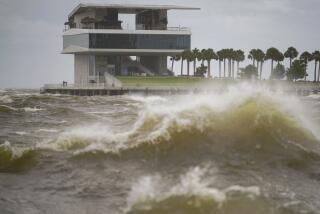U.S. Attacks an Iraqi City With Double-Edged Sword
Unable to enter the rebel-held city of Fallouja, U.S. forces have turned to airstrikes, the latest coming Monday. The U.S. claimed success, but images of reported civilian casualties threatened to further enrage Iraq’s Sunni Muslim population.
Columns of black smoke rose from Fallouja after the attack at 6:07 a.m. Hundreds of residents fled the city -- toward U.S. checkpoints that ring the area.
In the aftermath, the familiar conflicting reports emerged. The military lauded what it called a successful strike on the network of Abu Musab Zarqawi, the Jordanian militant thought to be behind a wave of car bombings, abductions and other attacks in Iraq.
But officials in Fallouja decried what they said was the killing of innocent civilians. Ten houses were destroyed, at least 16 civilians were killed and more than 20 were injured, officials said.
Neither account could be independently confirmed.
Fallouja is considered the heart of Iraq’s Sunni-led insurgency, which has stymied U.S.-led reconstruction efforts and thwarted the interim government. Unable to enter the town since the spring, U.S. forces have turned to an intense bombing campaign. The strategy seems to straddle the thin line between hurting the insurgency and enraging the citizenry.
“Every time, they justify it by saying they are striking militants, but there are never any militants killed,” Sheik Ahmed Abdel Ghafour, a leading member of the Muslim Scholars Assn., said Monday on Al Arabiya, an Arabic-language television network.
U.S. authorities have disclosed little about the effectiveness of the bombing runs, but on Sunday several high-ranking Marine officers described the campaign as a great success and confirmed that Zarqawi was a target.
The militant is said to be extremely wary of U.S. surveillance, be it from the sky, electronic eavesdropping or informants on the ground.
“He’s very scared,” said Lt. Gen. James T. Conway, outgoing commander of the 1st Marine Expeditionary Force near Fallouja. “He won’t be within two people of a cellphone. He protects his movements, and he’s learned how to be elusive. So we continue to search.”
The airstrikes, combined with skirmishes and all-out battles on the edges of Fallouja in recent months, have killed hundreds of militants and illustrate the divisions in the insurgent ranks, said Col. John C. Coleman, chief of staff for the expeditionary force, which patrols much of Sunni-dominated western Iraq. The strikes have seriously disrupted rebel operations in the town and surrounding areas, he said.
“There’s a few more dead ones,” Coleman said. “They won’t operate with impunity. They’re quite often now looking over their shoulders -- in a vertical sense. They’ve varied their patterns of activities and they’re not quite as free to operate as they might like to be.”
The Marines pulled out of Fallouja in April after a three-day offensive, leaving an Iraqi force in charge. The Marines have not returned, and the city of 300,000 people has in effect fallen into the hands of guerrillas.
While bemoaning Fallouja’s transformation into a guerrilla sanctuary, Marines say the pullout helped expose fissures among assorted factions -- religious militants from inside and outside Iraq, loyalists of deposed leader Saddam Hussein, anti-U.S. nationalists and others.
No longer directly confronting U.S. forces, Coleman said, the rebels had been fighting among themselves, pressured by the U.S. bombing.
“When we attacked in that city, all the various factions that are represented ... coalesced in a marriage of convenience -- and, basically, designated us as the common enemy,” Coleman said. “They were arranged in a very tight, 360-degree circle, all faced outward at us, and they were all willing to engage us in the fight.”
Absent the U.S. presence, the colonel said, intense opposition has arisen to the hundreds of foreign fighters -- mostly from other Arab nations -- who are said to have concentrated their forces in Fallouja. Reports indicate efforts to impose a Taliban-like Islamic regime there, with women forced to wear veils and religious authorities passing civil judgment.
One indication of the factionalism, Coleman said, is the frequent nighttime gun battles in town -- confrontations that do not involve coalition forces.
“There are many nights in the city when we are doing absolutely nothing there, and there’s a lot of activity,” he said, noting that in the spring all fire was aimed at coalition forces. “Those same people are now shooting at each other.”
In Monday’s action, U.S. officials boasted of a “precision strike” on a meeting place allegedly used by Zarqawi.
“Intelligence reports indicated that only Zarqawi operatives and associates were at the meeting location at the time of the strike,” the U.S.-led multinational command said. “Based on analysis of these reports, Iraqi security forces and multinational forces effectively and accurately targeted these terrorists while protecting the lives of innocent civilians.”
But the images that appeared on Arab television -- of destroyed homes and people burrowing through the wreckage for their belongings -- suggested that civilians had been hit.
Times staff writer Ashraf Khalil in Baghdad and a special correspondent in Fallouja contributed to this report.
More to Read
Sign up for Essential California
The most important California stories and recommendations in your inbox every morning.
You may occasionally receive promotional content from the Los Angeles Times.










